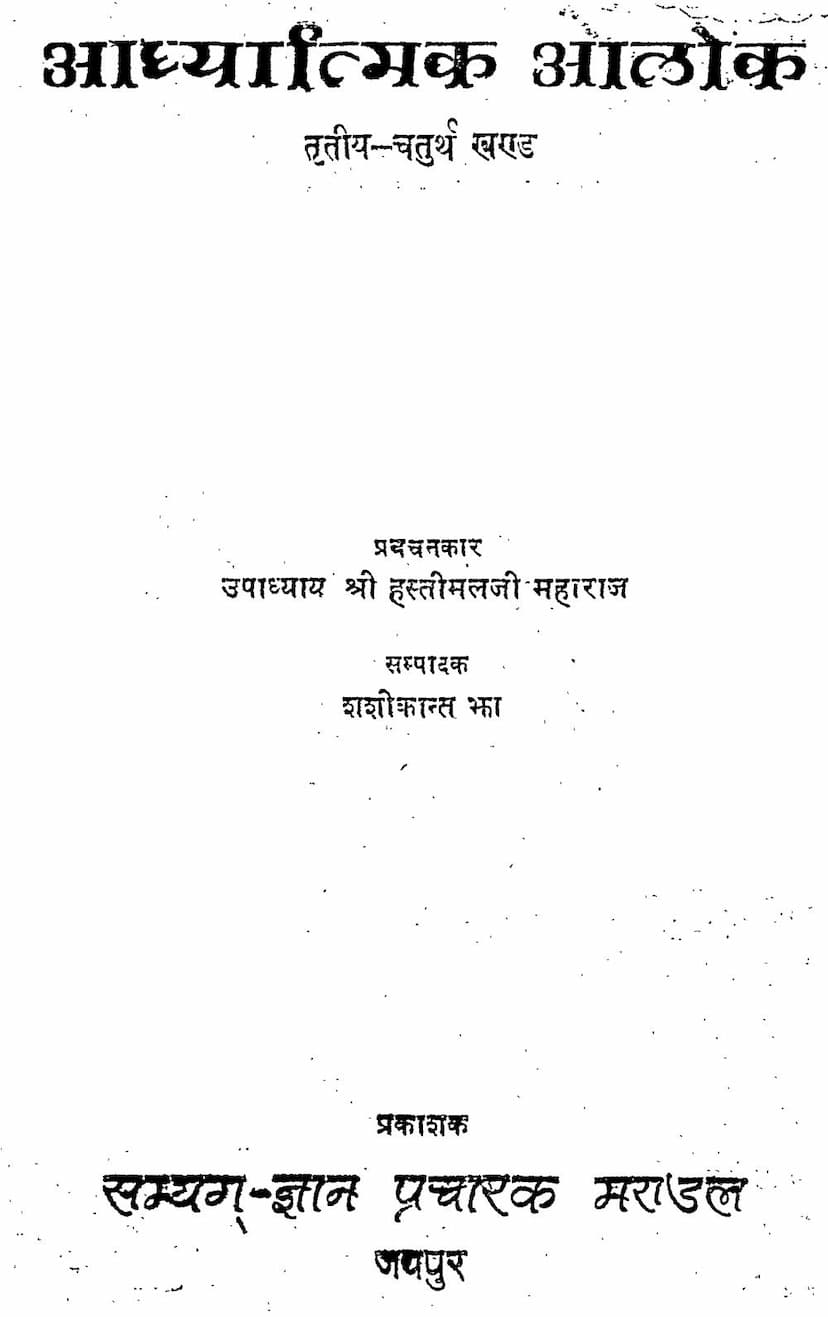Aadhyatmik Aalok Part 03 And 04
Added to library: September 1, 2025

Summary
Here's a comprehensive summary of the Jain texts "Aadhyatmik Aalok Part 03 and 04" by Hastimal Maharaj, as found in the provided text:
Overview:
"Aadhyatmik Aalok Parts 03 and 04" is a compilation of discourses by Upadhyay Hastimalji Maharaj, edited by Shashikant Jha and published by Samyag Gyan Pracharak Mandal, Jaipur. The catalog link provided confirms its Jain religious nature. The books contain 45 discourses given during his Chaturmas in Sailana (Madhya Pradesh). The publisher expresses gratitude to Seth Pyarchand Ratanlalji Ranka of Sailana for his financial support in publishing this work. The publisher highlights that these discourses aim to divert readers' attention from worldly matters to the divine realm, a place beyond sensory experience, where the soul finds contentment in self-realization.
Core Themes and Concepts:
The text delves deeply into various aspects of Jain philosophy and practice, primarily focusing on ethical conduct, spiritual discipline, and the path to liberation. Key themes include:
- The Nature of the Soul and Bondage: The soul is described as inherently pure, blissful, and divine. However, due to the admixture of extraneous substances (karma), it becomes impure and bound. The core of spiritual practice is to stop this inflow of karma (asrava) and shed accumulated karma (nirjara) to achieve liberation.
- The Vows and Their Transgressions (Aticharas): A significant portion of the text details the five great vows (Mahavratas) and their associated transgressions (Aticharas). Each vow is explained in depth, with specific examples of how these transgressions manifest in daily life and spiritual practice.
- Ahimsa (Non-violence): This is presented as the paramount principle, extending beyond mere physical violence to include violence in thought and speech. Even subtle forms of harm to any living being (from one-sensed to five-sensed) are discussed.
- Satya (Truthfulness): The importance of speaking truth is emphasized, but with the caveat that it should not cause harm or be used maliciously.
- Asteya (Non-stealing): This vow is explored not just as literal theft but also through its indirect forms, such as buying stolen goods, abetting thieves, and engaging in illicit trade or smuggling.
- Brahmacharya (Celibacy/Chastity): The text discusses both complete celibacy for ascetics and restraint within marriage for householders. It emphasizes the importance of controlling sensual desires and the detrimental effects of their indulgence.
- Aparigraha (Non-possession): This is explored through the concept of limiting possessions, both external (wealth, property) and internal (attachment, greed). The dangers of excessive accumulation and attachment are highlighted.
- Karma and Its Role: The text explains the concept of karma as the causal factor for bondage and suffering. It differentiates between good (punya) and bad (papa) karma, while ultimately emphasizing that both need to be transcended for liberation. The importance of karma yoga (action without attachment) is subtly conveyed.
- The Importance of Sangati (Company): The influence of good company (satsang) and the wisdom of saints are highlighted as crucial for spiritual progress.
- Ethical Conduct in Daily Life: The discourses provide practical guidance on ethical living, especially for householders (Shravakas). This includes aspects of business ethics, honesty in dealings, compassion towards all beings, and the responsible use of wealth.
- The Transformative Power of Spiritual Guidance: The narrative of Rupkosh, the courtesan, and her transformation through the teachings of Muni Sthulbhadra, serves as a powerful example of how divine guidance can bring about profound change in an individual's life.
- The Nature of True Knowledge and Practice: The text stresses that mere intellectual knowledge (jnana) is insufficient without right conduct (charya). True knowledge leads to right faith (samyak darshan) and right conduct (samyak charitra), which are essential for spiritual progress.
- The Significance of Vows (Vrata): Taking vows, even with certain limitations (Anuvratas), is presented as a way to gradually curb passions and move towards greater spiritual purity. The idea of parigraha pariman (limiting possessions) and bhogopbhog pariman (limiting consumption of consumables) is central to this.
- Mind Control and Inner Discipline: The text repeatedly emphasizes the mind's power and the necessity of controlling its fluctuations through practices like samayik (equanimity) and meditation.
- The Role of Faith and Perseverance: The importance of unwavering faith in the teachings and the path, coupled with diligent effort (purushartha), is highlighted as crucial for overcoming obstacles and achieving the ultimate goal.
- The Nature of True Happiness: True happiness is described as arising from inner contentment (atmanda) and detachment (vairagya), rather than external possessions or sensory pleasures.
Specific Examples and Narratives:
- The Story of Rupkosh: This is a central narrative illustrating the transformative power of spiritual guidance and the possibility of overcoming past negative karma through sincere spiritual practice. Muni Sthulbhadra's interaction with Rupkosh shows how even someone in a fallen state can be uplifted.
- Anand Shravaka: His adherence to the vows and his understanding of the principles are used as an example for householders.
- The Disciples of Sambhutivijaya: The text recounts the experiences of Sthulbhadra and his fellow monks, highlighting the challenges of spiritual practice, the subtle nature of desires, and the importance of correct understanding and vigilance. Sthulbhadra's unique accomplishment of transforming Rupkosh is contrasted with the challenges faced by others.
- The Importance of Proper Rituals and Intentions: The text also touches upon the nuances of religious practices, stressing that the intention behind an action is as important as the action itself.
Overall Message:
"Aadhyatmik Aalok Parts 03 and 04" serves as a guide for spiritual seekers, offering profound insights into Jain philosophy. It encourages a life of ethical conduct, self-discipline, and detachment from worldly desires. The ultimate aim is to awaken the soul's inherent purity and bliss, leading to liberation from the cycle of birth and death. The teachings are presented in a way that is both spiritually profound and practically applicable to daily life.